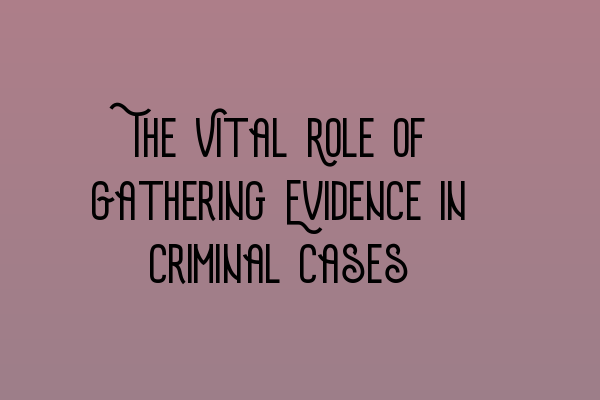The Vital Role of Gathering Evidence in Criminal Cases

Criminal cases require meticulous investigation and compilation of substantial evidence to establish guilt or innocence. Gathering evidence is a crucial step in the criminal justice process that helps ensure a fair trial and the protection of individual rights. In this article, we will delve into the vital role of gathering evidence in criminal cases and highlight its significance in the legal system.
The Importance of Evidence in Criminal Cases
Evidence serves as the foundation of a criminal case, providing the necessary facts, information, and proof to support arguments and substantiate claims. It allows the prosecution or defense to present a compelling case based on facts rather than mere conjecture. The successful collection and presentation of evidence significantly impact the outcome of a criminal trial.
Types of Evidence
There are various types of evidence that can be presented in a criminal case:
- Direct evidence: This is evidence that directly proves a fact without requiring any inference or presumption. It includes eyewitness accounts, confessions, videos, photographs, and documents.
- Circumstantial evidence: Also known as indirect evidence, this type of evidence requires an inference to establish a fact. It involves linking a series of facts or circumstances to draw a conclusion. For example, if a suspect’s fingerprints are found at the crime scene, it may be circumstantial evidence of their involvement.
- Physical evidence: Physical evidence refers to tangible objects or materials found at the crime scene that may be related to the crime. This can include weapons, clothing, DNA samples, or fingerprints.
- Testimonial evidence: Testimonial evidence is provided by witnesses who testify under oath in court. Their accounts and statements can provide important information that supports or contradicts the prosecution or defense’s arguments.
The Collection Process
Gathering evidence in a criminal case involves a systematic and thorough collection process:
- Crime scene investigation: Law enforcement authorities conduct a detailed examination of the crime scene to identify and collect potential evidence. This includes taking photographs, sketches, and measurements, as well as collecting physical objects.
- Witness interviews: Investigators interview witnesses to gather testimonial evidence. These interviews may take place at the crime scene or at a later stage. Witness statements are recorded and documented for future reference.
- Forensic analysis: Physical evidence collected from the crime scene, such as DNA samples, fingerprints, or ballistics, undergoes forensic analysis. Forensic experts employ scientific techniques to examine and interpret the evidence, providing valuable insights for the prosecution or defense.
- Documentary evidence: Relevant documents, such as contracts, bank statements, or emails, may be obtained as evidence to support legal arguments. These documents are reviewed, analyzed, and authenticated as part of the collection process.
The Role of Technology in Evidence Gathering
The advancements in technology have revolutionized the way evidence is gathered in criminal cases. Technology allows for the efficient collection, analysis, and presentation of evidence. Digital evidence, such as surveillance footage, emails, or social media posts, can play a crucial role in establishing guilt or innocence. The utilization of forensic software and tools enables investigators to process and analyze vast amounts of data, uncovering hidden connections and patterns.
The Need for Legal Expertise
Gathering evidence in criminal cases requires a deep understanding of legal procedures and principles. Legal professionals, such as solicitors and barristers, play a critical role in ensuring the admissibility and relevance of evidence. They guide the collection process, assess the strength of the evidence, and strategize the presentation of the case. A skilled legal team understands the complexities of the legal system and strives to protect the rights of their clients.
Conclusion
In conclusion, gathering evidence forms the foundation of a criminal case. It provides the necessary support to arguments, helps establish guilt or innocence, and safeguards the principles of fairness and justice. The careful collection, analysis, and presentation of evidence, along with the expertise of legal professionals, contribute to a successful trial outcome. Understanding the vital role of evidence in criminal cases underscores the significance of a thorough and comprehensive investigation.
For more information on related legal topics, please check out the following articles:
- Legal Representation for Delaware LLCs in the UK: Expert Advice
- Ensuring Ethical Business Practices: Delaware’s Code of Conduct
- Legal Challenges for UK Businesses in the U.S.: Strategies for Overcoming Hurdles
- UK Criminal Law: An In-Depth Analysis of the British Legal System
- Legal Challenges for UK Businesses in the U.S.: Strategies for Overcoming Hurdles
